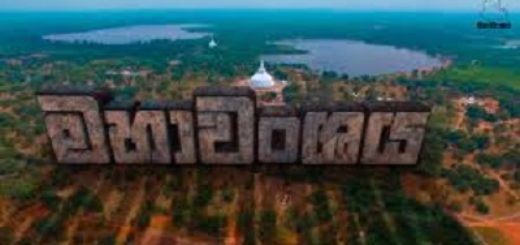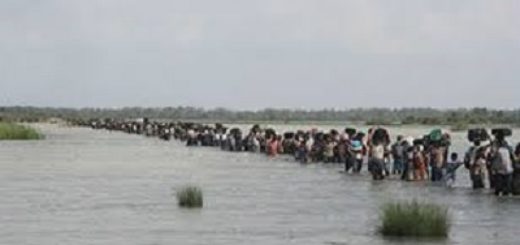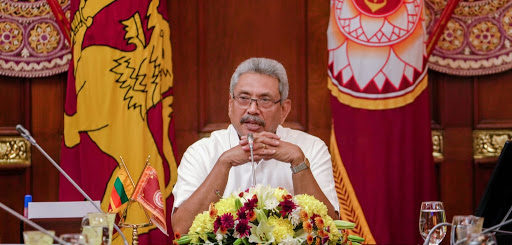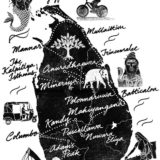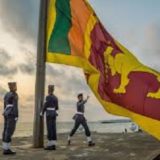When Prof. Laksiri Fernando came marching in
I am impressed by Prof. Laksiri Fernando’s letter to the Governor of Jaffna highlighting the failure of his administration to issue summons in Tamil to a Tamil journalist of Jaffna. This journalist has a right to receive a communication from the government in his mother tongue. To issue summons in Sinhalese is a violation of his legal and human rights. I wish to congratulate Prof. Fernando for the bold stand he has taken to protect the rights of Tamils. Well done, Professor! And I mean it. I am with you all the way.
Now we have also to consider the next scenario with equal concern : The Government Agent of Jaffna, N. Vethamayahan, wrote an official letter to the Ven. V. N. Padumahathitha Thissa Thero of the Rajamahavihara in Nainativu (Nagadeeepa) referring the application to construct a Buddha statue in the temple to the Coast Construction and Central Resource Management Department — no not in Sinhalese — but in English. Prof. Fernando can’t deny that he did not know about it because the GA’s letter was published in the Colombo Telegraph in relation to another story. He raised Cain in defence of the Tamil journalist, and quite rightly too. But does he have a right to be deaf, dumb and blind when the same administrative failure hits the Sinhalese?
The simple explanation is that in the Police Station and in the GA’s office there were no qualified staff to reply in the language of the recipients. Obviously, the same administrative blunder that occurred in the case of the Tamil journalist also occurred in the case of the Buddhist monk. I am sure this must be happening to the Muslims as well. Without making excuses, it can be admitted that has happened since 1956 and it will continue to go on until the issue is addressed with adequate bilingual staff. I don’t think it is a deliberate policy of the Government— certainly not of the Yahapalanaya government which is stretching every limb to appease the Tamil demands — to deny the right of the Tamils to receive communications from the state in a non-Tamil language.
If the Professor can prove that it is the deliberate policy of the Government to deny the Tamil their right to receive state communications in their mother tongue then it should be condemned roundly and remedial steps should be taken forthwith. But that is not the case and he knows it. Or at least he should know it. He could have always checked the facts easily with his old university mate, the Governor, without grandstanding to pose as a champion of the rights of the Tamils, and/or to vilify the Sinhala-Buddhists as the villains who are out to deny the Tamils their rights. It is absolutely childish and irresponsible on his the part to run around like a chook without a head each time the Tamils complain that the Sinhala government” is not sending letters in Tamil. At least he should have balanced this complaint with that of the administrative failure to reply the Buddhist monk in Sinhala.
To blow this up into a deafening cry of discrimination by the Sinhala government” against the Tamils is a deliberate propaganda ploy by Prof. Fernando to exacerbate the delicate Sinhala-Tamil relations as it exists now. His politics of exploiting an administrative defect as a deliberate policy of discrimination against the Tamils by a Sinhala-Buddhist government” (which is what the Tamils in the diaspora would do in the West) does not do much credit to his intelligence. When he has direct access to his old mate to check the facts what does he do : he makes a ha-ho as if the entire Sinhala-Buddhist state” is bent on oppressing and persecuting the Tamils. This is not the way to go forward towards reconciliation. Every peace-loving individual will agree that we have to get out of the old mould and be more understanding of each other’s failures. Rectifying errors are a necessity. But to exploit the missteps for political grandstanding is counterproductive.
Of course, most of this stems from the incurable paranoia which makes the Tamils and their agents believe that everything that the Sinhalese has done since independence has been to deny them their rights, their dignity, their history, their prosperity, etc., etc. Every administrative, political, economic misstep of the state has been exploited by the Tamil leadership to polarise the society. I do not deny that the clash of the subterranean historical forces unfolding in the post-independent era, both in the north and the south, contributed to each other’s fears and misery. Undoubtedly, the conflicting policies of the state and the Tamil leadership pushed each other into extremist corners from which they could not get out. Their respective fears that generated incurable suspicions eventually derailed communal harmony.
It happened on both sides of the communal divide. For instance, scare-mongering, demonising the Sinhala-Buddhist as the inveterate enemy of the Tamils, has been the standard tactic of the Tamil political class to win votes in the Jaffna electorate. Political scientists have never looked into the single-minded racism – no other ideology propelled northern politics — that warped Jaffna society and prevented any compromise short of their extremist demands possible. Step by step they escalated Tamil racism, on the little now and more later” tactics of S. J. V. Chelvanayakam, until they painted themselves into inescapable corner of the Batakotte (Vadukoddai) declaration of war against the nation in 1976. Demonising the Sinhala governments”, they refused to acknowledge that the best period in their brief history, starting from the 13th century, was when they co-existed peacefully with the Sinhala-Buddhists since 1948. (This aspect has to be developed separately.)
The symbiotic relationship that held both communities together for millennia has always yielded good harvests to both communities and the nation as a whole. But the tragedy is that the social scientist who stepped in to pontificate on the escalating crisis pointed their finger only at the south without a commensurate analysis of the racial juggernaut that came hurtling down from the north and crushed everything in its destructive path. This mono-causal theory of blaming only the Sinhala-Buddhists blinded the competing politicians and the decision-makers of both sides. The most minute slipup was picked up and exaggerated as the racist policies of the state against the Tamil minority. As I used to say, if Velupillai Prabhakaran had constipation they would blame the Sinhala government” for not sending basmati rice and porichchi koli, his favourite, while he fed the Tamil youth with suicide pills.
The tilt towards one side, as if the victims were only Tamils, has been a common crime committed by our so-called human rights activists and intellectuals. The latest example is the summons sent in Sinhalese to a Tamil journalist. Any stick is good enough for the anti-Sinhala-Buddhist gangs to beat the Sinhala governments”. Consider, for instance, the role played by Ms. Radhika Coomaraswamy, the head of ICES. She would hold seminars, inviting international dignitaries, to say NEVER AGAIN” to 1983. That is acceptable. But what is not acceptable is her refusal to hold similar seminars to remember the victims of Kathankudi where the innocent Muslims at prayer were massacred by the Tamil Tiger terrorists or the Sinhalese victims at Arantalawa slaughter house. When did she hold a ‘NEVER AGAIN” to the crimes committed against non-Tamils? When did Jehan Perera and Paki Saravanamuttu rave and rant against the Tamils for committing crimes against Sinhalese and Tamils in the global and local fora the way they did to demonise the Sinhala-Buddhists? Didn’t the non-Tamils bleed when the Tamil Tiger terrorists slaughtered the innocent Muslim and Sinhalese non-combatants?
These one-eyed Jacks and Jills made compromise and reconciliation an impossibility because their rationalisations justified and reinforced the racist ideology of the ruling Vellala elite – there was no other politics in Jaffna other than the Vellala politics – to pursue relentlessly the intransigent policy of insisting that the only way out was to give in to every demand of the North, including separatism, irrespective of the consequences to the other communities. The Batakotte (Vadukoddai) Resolution of 1976 summarises the essence of the mono-causal politics manufactured by the one-eyed Jacks and Jills in academia. It contains their version of history, politics, fears, aspirations and, finally, the declaration of war to achieve their Eelam, deliberately opting out of the democratic mainstream. Like most other crises their kind of racism became fashionable in the post-Cold War period.
In the 20th century racism triumphed in the name of minority rights. Partisan theorists boosted minoritarianism as being superior to majoritarianism even though the evidence in Sri Lanka ran contrary to this fiction, proving that majoritarianism was more humane and democratic than minoritarianism, even under stressful conditions of a brutal war. The central issue in Sri Lanka too boiled down to the relationship between the majority and the minority. Race relations became the overwhelming force that replaced Left-Right politics that overwhelmed the 20th century. Racism is the new spectre that haunts global and local politics. It is the new ideology that plagues global politics. And the global and local experiences have repeatedly driven home the conclusion that neither violence nor separatism can be the answer to the plague of our time.
The latest incident raised by Prof. Fernando is the kind of racist singularity peculiar to peninsular politics. He tends to pick the slightest mishap to justify racism that leads to intransigent politics and violence. His hidden agenda in picking this infinitesimal incident is not to rectify it but to boost the cause of Tamil extremism which is now re-emerging through constitutional changes. He is saying that this is what happens to the Tamils under the Sinhala governments and governors”. He is saying that if the Tamils want Tamil language enshrined they must have a Tamil regime though it may not guarantee the Sinhalese and Muslims living under their separate state their rights. As things are under the Tamil-dominated regime in the north, the Muslims can hardly get an appointment with the Tamil Chief Minister. That doesn’t concern the Professor. He is only concerned about a summons sent to a Tamil in Sinhalese. In other words, he is telling the Tamils that there is no hope in reconciliation because you will always get summons in Sinhalese. He is polarising the two communities. His highly publicised letter to the Governor should be viewed in this context. In itself it is a trivial incident but in the larger context of the devastating forces that shook the foundations of the nation in the post-independent era it moves into another level of greater significance. He, in sort, advising the Tamils to follow the path Ponnambalam because the Sinhala governments” will not give the Tamils their disproportionate share of power. As I said earlier, he is acting like an incorrigible Ponnambalaya!
Please Professor, you and I have witnessed enough brutalities and bloodshed. Can you kindly stop this nonsense of posing as Napoleon Bonaparte charging around in his steed, waving the banner of Liberty, Equality and Fraternite. When you pick up this trivia, which can add up bit by bit into catastrophic proportions, you will not look like Bonaparte. You will end up looking more like Boru-part! So can you give us break, please!

